|
|
|
Sort Order |
|
|
|
Items / Page
|
|
|
|
|
|
|
| Srl | Item |
| 1 |
ID:
076919
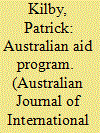

|
|
|
|
|
| Publication |
2007.
|
| Summary/Abstract |
The Australian government's White Paper on aid provides a blue print for the Australian aid program for the next decade. While it ostensibly has a focus on poverty, it still sees economic growth and effective government as the path to poverty reduction. This article analyses and highlights the issues associated with this approach to poverty. These are: growing inequality and vulnerability, the rural-urban divide in poverty outcomes, and increasing social exclusion leading to increasing social and political insecurity. The article then examines the alternative policies adopted by the British aid agency, DFID, and concludes with some suggestions on how the practice of the Australian aid program can better match the goal of poverty reduction
|
|
|
|
|
|
|
|
|
|
|
|
|
|
|
|
| 2 |
ID:
128461


|
|
|
|
|
| Publication |
2014.
|
| Summary/Abstract |
An emphasis on making markets work for the poor has thrust companies into the role of 'development agents' - organisations that consciously seek to deliver outcomes that contribute to international development goals. This paper examines what business as a development agent means in terms of the promise, the conceptualisation and the developmental outcomes of several initiatives engaged in 'bottom billion capitalism'. It argues that, while these initiatives are hailed as a solution for poverty, the benefits of such engagement must be weighed against other factors, including exclusion, the emphasis on capital assets and the reinterpretation of positive outcomes. The paper presents an alternative model of business as a development agent that better meets the criteria for a genuine development actor.
|
|
|
|
|
|
|
|
|
|
|
|
|
|
|
|
| 3 |
ID:
182775
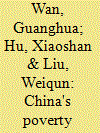

|
|
|
|
|
| Summary/Abstract |
Miracle reductions in absolute poverty led China to announce, in late 2019, the strategic change from targeting absolute poverty to targeting relative poverty. After highlighting China's success in the fight against absolute poverty, this paper attempts to assess the roles of growth and income inequality in affecting both absolute and relative poverty rates. Poverty decomposition and panel-VAR modelling results show that growth played an overwhelming role in achieving the miracle of poverty reduction but relative poverty has been consistently rising. And growth, contrary to the case of absolute poverty, actually has contributed to the rising trend of relative poverty. Conversely, income inequality has played a small role in aggravating absolute poverty but a moderate role in raising relative poverty. Therefore, it seems appropriate for China to continue targeting absolute poverty with a higher poverty line. In the case that China insists on shifting the poverty alleviation strategy, market-led growth can no longer be relied on to reduce relative poverty. Instead, government-led pro-poor policies must be instituted by providing employment, education, training and other opportunities to the disadvantaged groups, in addition to the usual social assistance.
|
|
|
|
|
|
|
|
|
|
|
|
|
|
|
|
| 4 |
ID:
143576


|
|
|
|
|
| Summary/Abstract |
Globally there is an increasing focus on the private sector as a significant development actor. One element of the private sector’s role emphasised within this new focus has been corporate social responsibility (CSR) activities, whereby the private sector claims to contribute directly to local development. There is now a substantial body of work on CSR but it is a literature that is mostly polarised, dominated by concerns from the corporate perspective, and not adequately theorised. Corporations typically do development differently from NGOs and donors, yet the nature and effects of these initiatives are both under-researched and under-conceptualised. In this paper we argue that viewing CSR initiatives through a community development lens provides new insights into their rationale and effects. Specifically we develop a conceptual framework that draws together agency and practice-centred approaches in order to illuminate the processes and relationships that underpin corporate community development initiatives.
|
|
|
|
|
|
|
|
|
|
|
|
|
|
|
|
| 5 |
ID:
121964
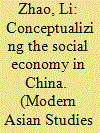

|
|
|
|
|
| Publication |
2013.
|
| Summary/Abstract |
This study offers a conceptual analysis of the social economy in China within the context of institutional transition. In China, economic reform has engendered significant social changes. Accelerated economic growth, privatization of the social welfare system, and the rise of civil society explain the institutional contexts in which a range of not-for-profit initiatives, neither state-owned nor capital-driven, re-emerged. They are defined in this research as the social economy in China. This study shows that although the term itself is quite new, the social economy is no new phenomenon in China, as its various elements have a rich historical tradition. Moreover, the impact of the transition on the upsurge of the Chinese social economy is felt not only through direct means of de-nationalization and marketization and, as a consequence, the privatization of China's social welfare system, but also through various indirect means. The development of the social economy in China was greatly influenced by the framework set by political institutions and, accordingly, legal enabling environments. In addition, the link to the West, as well as local historical and cultural traditions, contribute towards explaining its re-emergence. Examining the practices in the field shows that the social economy sector in China is conducive to achieving a plural economy and an inclusive society, particularly by way of poverty reduction, social service provision, work integration, and community development. Therefore, in contemporary China, it serves as a key sector for improving welfare, encouraging participation, and consolidating solidarity.
|
|
|
|
|
|
|
|
|
|
|
|
|
|
|
|
| 6 |
ID:
153100
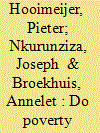

|
|
|
|
|
| Summary/Abstract |
The Rwandan Government has implemented various education policies that contribute to higher enrolment in education, but has become aware that these policies might be less effective for children from poor families. This study investigates the contribution of poverty reduction programmes on education expenditure of households. Using a multi-level regression analysis, combining district data on labour markets with detailed expenditure data on 7,230 households, it teases out the effects of several social protection programmes. The results show that access to health insurance and to waged work are positively related, while direct financial or in kind support are negatively related to paying into the children’s schooling. Non-agricultural employment opportunities in particular seem to stimulate education investments. Reducing the vulnerability of households might provide more equal access to these opportunities.
|
|
|
|
|
|
|
|
|
|
|
|
|
|
|
|
| 7 |
ID:
186224
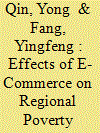

|
|
|
|
|
| Summary/Abstract |
This paper uses the Rural E-Commerce Demonstration County (REDC) policy to estimate the effect of e-commerce on poverty reduction. We discover that the REDC policy enhanced the gross regional product per capita by 8.4 percent for the total sample of counties and 10.5 percent for a subsample of poor counties. Specifically, the REDC policy increased the aggregate final product in primary industry by 10.6 percent. The final product per capita in the secondary and service sectors was 13.1 percent and 3.3 percent higher in the REDCs than in other counties, respectively. The effects were even greater for the subsample of poor counties. The estimates demonstrate that e-commerce developed quickly in the REDCs since the implementation of the REDC policy. The income of those involved in e-commerce increased, yielding more aggregate savings deposits. The expansion of e-commerce induced more investment, suggesting that more aggregate loans are being made in REDCs. This evidence suggests new opportunities for poor people in the new digital economy.
|
|
|
|
|
|
|
|
|
|
|
|
|
|
|
|
| 8 |
ID:
076898
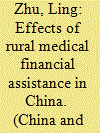

|
|
|
| 9 |
ID:
163503
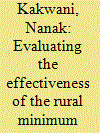

|
|
|
|
|
| Summary/Abstract |
China's Rural Minimum Living Standard Guarantee program (Dibao) is the largest social safety-net program in the world. Given the scale and the popularity of Rural Dibao, it is necessary to rigorously evaluate it so that policymakers know the extent to which the program meets its intended objective of reducing poverty. This paper develops some new methods and uses data from the 2013 Chinese Household Income Project (CHIP2013) to examine the targeting performance of the rural Dibao program. The paper has found that the Rural Dibao program suffers from very low targeting accuracy, high exclusion error, and inclusion error, and yields a significant negative social rate of return. It discusses possible causes and argues that the fundamental mechanism has to be redesigned to increase the effectiveness of the program. The paper makes some recommendations to reform Dibao that will significantly improve targeting and reduce the cost of running the program. That will help China to achieve its goal of eradicating extreme poverty by 2020.
|
|
|
|
|
|
|
|
|
|
|
|
|
|
|
|
| 10 |
ID:
151516
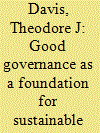

|
|
|
|
|
| Summary/Abstract |
Data indicate that good governance and human development continue to be major issues throughout sub-Saharan Africa. The findings show a significant relationship between the measures of good governance and human development. The findings suggest that policies and efforts aimed at improving government effectiveness and political stability would have the most significant impact on human development and poverty reduction efforts. The findings lend support to the adoption of integrated policy approaches that take into consideration political development along with economic development to reduce poverty in sub-Saharan Africa.
|
|
|
|
|
|
|
|
|
|
|
|
|
|
|
|
| 11 |
ID:
165071


|
|
|
|
|
| Summary/Abstract |
This paper asks how comprehensive and holistic is the World Bank’s current development model, also known as the Comprehensive Development Framework (CDF), in Africa? By comprehensive and holistic, I am referring to whether the framework has the ability to capture the sources of all impediments to progress in different African contexts and offer corresponding solutions. I argue that the CDF is myopic and hackneyed. Not only does the World Bank employ the same neoliberal logic that informed structural adjustments, but it also continues to miss crucial non-material facets of development in the African countries it purports to serve. I make this argument by comparing the CDF/Poverty Reduction Strategy Papers (PRSP) model in Kenya to the under-utilised development philosophy of Wangari Maathai. This comparison intimates that an alternative to the CDF is not only possible, but also necessary. Maathai demonstrates how any holistic development approach for postcolonial Africa must grapple with both international and domestic factors that historically and currently exacerbate the chrysalis of political, economic, and social progress. A comprehensive approach must also deal with the particulars of each context while not eliding the uniform histories of exploitation and purposive underdevelopment that many African countries share.
|
|
|
|
|
|
|
|
|
|
|
|
|
|
|
|
| 12 |
ID:
103953
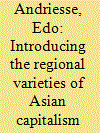

|
|
|
| 13 |
ID:
094522
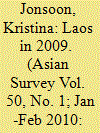

|
|
|
| 14 |
ID:
076454
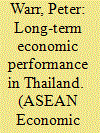

|
|
|
| 15 |
ID:
138252
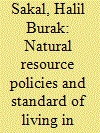

|
|
|
|
|
| Summary/Abstract |
This paper evaluates Kazakhstan’s natural resource policies and their impact on the standard of living of the Kazakhstan population within the framework of three determinative factors: globalization and international markets; Soviet legacy and ‘resource nationalism’; and Nursultan Nazarbayev and his authoritarian leadership. It argues that natural resource policies of Kazakhstan failed to improve the living standards of the majority of people in Kazakhstan, especially the poor and those living in oil-producing and rural areas, despite increasing oil prices and revenues. The argument will be supported with an analysis of Kazakhstan’s oil wealth distribution in light of global initiatives as well as with evidence derived from official reports and statistical data to find out whether Nazarbayev’s widely discussed ‘resource nationalism’ is ‘nationalistic’ enough to favour the whole nation.
|
|
|
|
|
|
|
|
|
|
|
|
|
|
|
|
| 16 |
ID:
128515
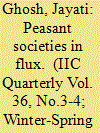

|
|
|
| 17 |
ID:
121775
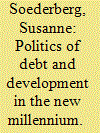

|
|
|
|
|
| Publication |
2013.
|
| Summary/Abstract |
This article serves as an introduction to this special issue of twq on 'Debt and Development in the New Millennium'. It highlights the gaps in our knowledge about debt that the following contributions seek to fill and why this is important, both analytically and politically. In doing so, it discusses two core objectives of the special issue: first, to examine the role(s) that debt plays in mediating the underlying tensions of neoliberal-led development and its emphasis on market-led growth and poverty reduction schemes; and, second, to interrupt, contest and deconstruct the dominant economic representations and meanings of debt. Although the contributions draw on different theoretical frames to explore different features of debt across a variety of social spaces, a core hypothesis running through each article is that that there are additional complex and paradoxical dimensions to debt beyond what is represented by its common-sense economic meaning as an amount of money borrowed, voluntarily, by one party from another. This introductory article concludes by providing the reader with an overview of each contribution comprising the special issue.
|
|
|
|
|
|
|
|
|
|
|
|
|
|
|
|
| 18 |
ID:
130979
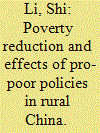

|
|
|
|
|
| Publication |
2014.
|
| Summary/Abstract |
The present paper describes changes in poverty reduction in recent decades and the effects of income growth and inequality on poverty reduction in rural China. The paper also examines the main poverty alleviation policies implemented in rural areas over the past 10 years and assesses the effectiveness and efficiency of these policies from the perspective of targeting accuracy. It is found that China has achieved significant progress in rural poverty reduction in recent decades, although the speed of poverty reduction has varied from one period to another. The largest contribution to rural poverty reduction has been economic growth, which has been increasingly offset by the inequality effect on poverty reduction. In addition, poverty alleviation policies are effective, but not efficient.
|
|
|
|
|
|
|
|
|
|
|
|
|
|
|
|
| 19 |
ID:
111486
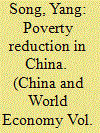

|
|
|
|
|
| Publication |
2012.
|
| Summary/Abstract |
Using the instrumental variable model and the regression discontinuity approach, this paper explores how access to primary education affects the Chinese labor market and helps people to escape poverty. Several important findings are obtained. The popularization of primary education has significantly reduced poverty in China, especially in urban areas. In contrast, the Compulsory Education Law has not been well implemented for older children in rural areas. In addition, the labor market premium for completing primary education is much larger in urban areas than in rural areas. Poor rural school quality might explain this rural-urban disparity. Effort needs to be made to further reduce poverty by ensuring adequate financial resources for primary education in poor areas and improving school quality in rural China.
|
|
|
|
|
|
|
|
|
|
|
|
|
|
|
|
| 20 |
ID:
078441
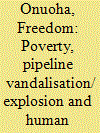

|
|
|
|
|
|
|
|